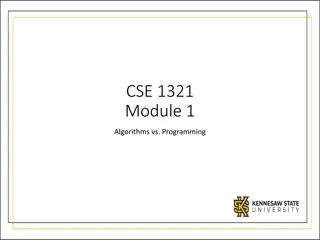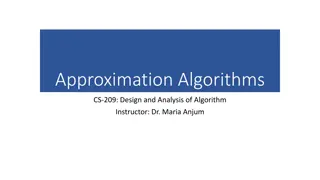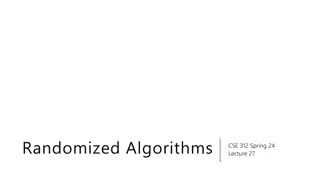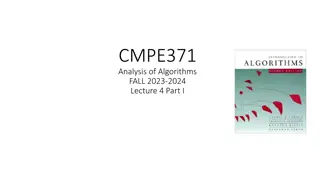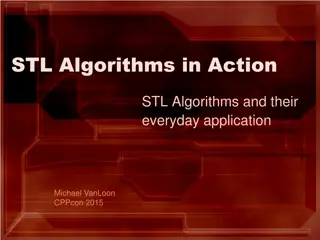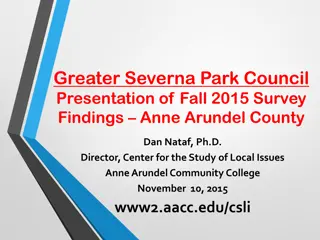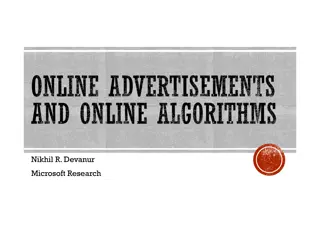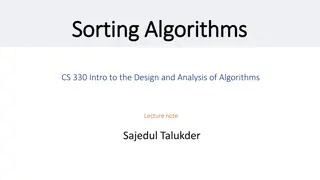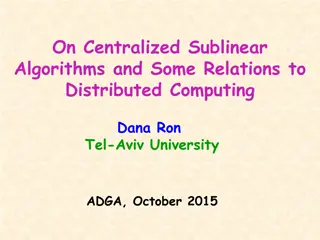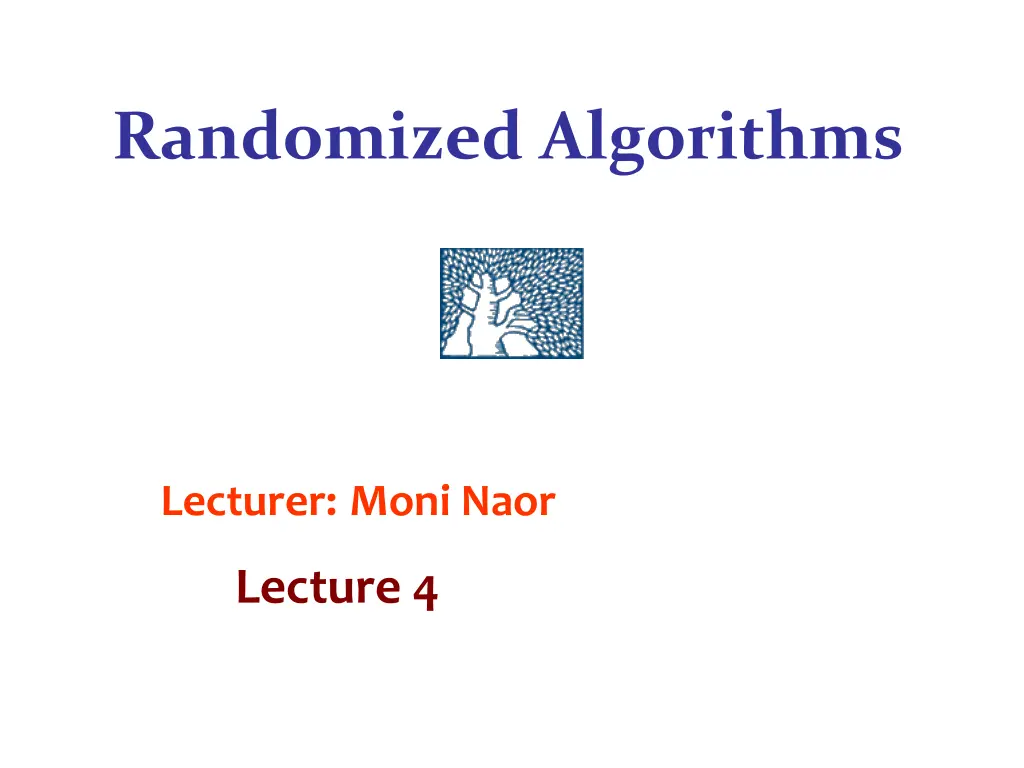
Randomized Algorithms Lecture Recap and Examples
Explore the concepts covered in a lecture by Moni Naor on randomized algorithms, complexity classes, Chernoff bounds, and more. Understand the streaming of data, amplification techniques, and computational tasks without sufficient memory storage. Dive into examples such as majority element identification and Boyer-Moore Majority Algorithm.
Uploaded on | 0 Views
Download Presentation

Please find below an Image/Link to download the presentation.
The content on the website is provided AS IS for your information and personal use only. It may not be sold, licensed, or shared on other websites without obtaining consent from the author. If you encounter any issues during the download, it is possible that the publisher has removed the file from their server.
You are allowed to download the files provided on this website for personal or commercial use, subject to the condition that they are used lawfully. All files are the property of their respective owners.
The content on the website is provided AS IS for your information and personal use only. It may not be sold, licensed, or shared on other websites without obtaining consent from the author.
E N D
Presentation Transcript
Randomized Algorithms Lecturer: Moni Naor Lecture 4
Recap and Today Recap Complexity Classes Chernoff Bounds Amplification Today Streaming Proof by encoding
Homework Vague: Question: Why choose majority and not some other function for amplification? Question: why does Freivald s matrix multiplication checking work? Question: Why does PP contain NP?
Streaming Suppose you want to compute a function on a stream of data but do not have enough memory to store it Which functions are computable? What accuracy Randomness essential A B
Example of a streaming problem: majority An array/stream of length n, elements from domain of size u Promise: there is a majority element, i.e. occurs strictly more than n/2 times. A simple one-pass algorithm, maintaining only the current candidate majority element and a counter for it.
Boyer Moore Majority Algorithm Initialize: current_guess m and a counter ? with ? = 0 Read next element x of the input sequence: If ? = 0: assign m x and i 1 else if ? = ? then i i + 1 else i i 1 Return m O(log n+ log u) bits One of the few deterministic algorithms in the area If a majority element exist, it is always returned
Computing on streams How many elements? How many different elements? What is the most frequent elements Who are the heavy hitters? Frequency Moments For element j U, let ?? {0,1,2,...,m} be the number of times that j occurs in the stream. For integer k, the kth frequency moment ?. ??:= ? ???
Multi-set equality We have two multi-sets A and B given in an arbitrary order. Once an element is given it cannot be accessed again (unless it is explicitly stored) and our goal a low memory algorithm for equality. Cannot hope to have a deterministic algorithm Idea: choose a function h and compute h(A) and h(B) gradually. h chosen from a family of hash functions H All the randomness comes from choice of h
Algorithm From the range of h Accumulators ??for A an ??for B Initialize ??and ??to 1 Choose a function ? Read next element c in the stream Say it is added to A Update ??: need to be able to compute (? {?}) from h, h(A) and c At end of stream: compare ??and ?? At any point in time ??should be h(A) seen so far ??should be h(B) seen so far Uniformly at random
Multi-set equality Need a family of functions H that is incremental in nature. For a function ?: Given h, h(A) and an element c: easy to compute (? {?}). For any two different multi-sets A and B the probability over the choice of ? that h(A) = h(B) is small. The description of h is short and the output of h is small.
Functions for Multi-set equality Treat the set A as defining a polynomial Polynomial is ?? revealed gradually as we learns the set (? ?) ??? = ? ? over a finite field of size is larger than the universe from which the elements of A are chosen+|A| say a prime Q > |U|. The members of the family H are called ?, for all y in GF[Q] and defined as ?(?) = ??(?).
Analysis The probability that two sets collide i.e. ?(?) = ?(?), which means that ??(?) = ??(?) is ???{|?|,|?|}/? This is the maximum number of points that two polynomials whose degree is at most max{|?|,|?|} can agree without being identical. Storing ?and storing (?) as it is computed requires just O(log Q) bits, The resulting algorithm never needs to store anything close in size to the original sets.
Computing on streams How many elements? How many different elements? What is the most frequent elements Who are the heavy hitters? Frequency Moments For element j U, let ?? {0,1,2,...,m} be the number of times that j occurs in the stream. For integer k, the kth frequency moment ?. ??:= ? ???

